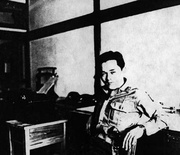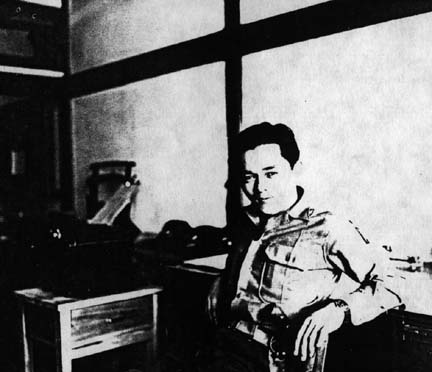
Banco de Dados da Experiência Militar Nipo-Americana

Junpei "Jake or Jun" Kawasaki
Sexo
Male
Birth date
1925-4-17
Local de nascimento
Los Angeles CA, U.S.A.
Inducted
1948-8-1, Fort Ord CA
Tipo de alistamento
Volunteer
Ramo das Forças Armadas
Army
Tipo de serviço
War,peacetime
Tipo de Unidade
Support
Unidades onde serviu
Army of Occupation, Japan; Army Language School, Presidio of Monterey, CA.
Military specialty
Counter Intelligence Corps; Assistant Language Instructor
Stationed
Japan; Fort Ord, CA; Presidio of Monterey, CA
Separated
Fort Ord CA
Unit responsibility
Counter Intelligence
Personal responsibility
Japanese Police Liaison; Background Investigation; Language Research.
Major battles (if served in a war zone)
None
Awards, medals, citations (individual or unit)
Japan Occupation; United Nation (Korean Campaign); Good Conduct Medals.
Living conditions
Private quarters (former Japanese Hotel), shower and/or tub. Meals well prepared by Japanese chef and on par with any stateside meals. Entertainment - weekly movies (provided by Army Special Services) plus local theater shows, night clubs, outdoor recreations and reading. Also took regular tour of historical sites and tourist attractions using assigned Army vehicle, as a part of self-orientation.
Most vivid memory of military experience
During interviews for background investigation, verification of a death in subject's family was invariably responded with a hideous smile (as if subject interviewee was somehow the cause because of irresponsible stupidity.... and, thus shamefully smiling).
Missed most whilst in the military
Nothing in particular. Was preoccupied with a busy schedule - in work and recreation.
Most important thing, personally, to come from military experience?
Understanding more the Japanese way of thinking and doing things. Knowing the language is an advantage, but since there are an ever growing number of books dealing with Japanese culture (in English and well done), it ought to be challenge the American-born (especially of Japanese descendents) ought to take on to make it a part of their bi-cultural heritage. There is much good to take pride in and it can only come from individual understanding and appreciation.
Additional information
1). The years immediately following the war (WWII), a large segment of Niseis ostensibly denied any ties with things Japanese. The infamous Pearl Harbor attack and the Japanese defeat caused a subconscious complex - prompting a disassociation mentality. It also caused many to separate themselves from Japanese Buddhist churches...and, caused the influx of Christian converts - a notion of Americanism to some. 2). Over thirty-years, since discharge from the Army, I have engaged in part-time studying of the Buddhist faith. The sad state of the English program (religious) prompted me to compile children's texts beginning with nursery-kindergarten through high school levels. It took approximately five or more years to complete. My input, however, was a provisional endeavor with the hope of encouraging the ecclesiastical hiercrchy to organize a serious English program. They took my attempts as personal aggrandizement and insolence. Of course, I must qualify my pronouncements as lending to the Nichiren Sect program. 3).The Buddhist Churches of America, a national body of Jodo-shin Sect including Nishi and Higashi Hongwanji churches, have made tremendous strides in promoting their English programs. Much has been learned of how the Buddhist faith had become popular in Japan. The Japanese, simply put, made the imported alien religion into a Japanese (or Japanized) religious faith - different and unique from how it is practiced in China or Korea and India. The main obstacle (or hindrance) in popularizing the Buddhist faith here lies in the obsession with redundant liturgical procedures and messages the American-born can relate to. Further, it is hard to understand the reasoning for using only partial excerpts from the Lotus Sutra in service book compilations when the whole text is available. The Christians use the whole Bible, and certain selections are read as they relate to message by the clergy. The gospel contained in the Lotus Sutra is filled with wonderful teachings, and the potential is there to bring back those who have wandered away. Shedding of banal encumbrances will allow the wonderful Dharma to shine. 4). My wife, Tomoe, and I have taken ballroom dance lessons, off and on, for 15 years, and are enjoying dinner/social functions together.


